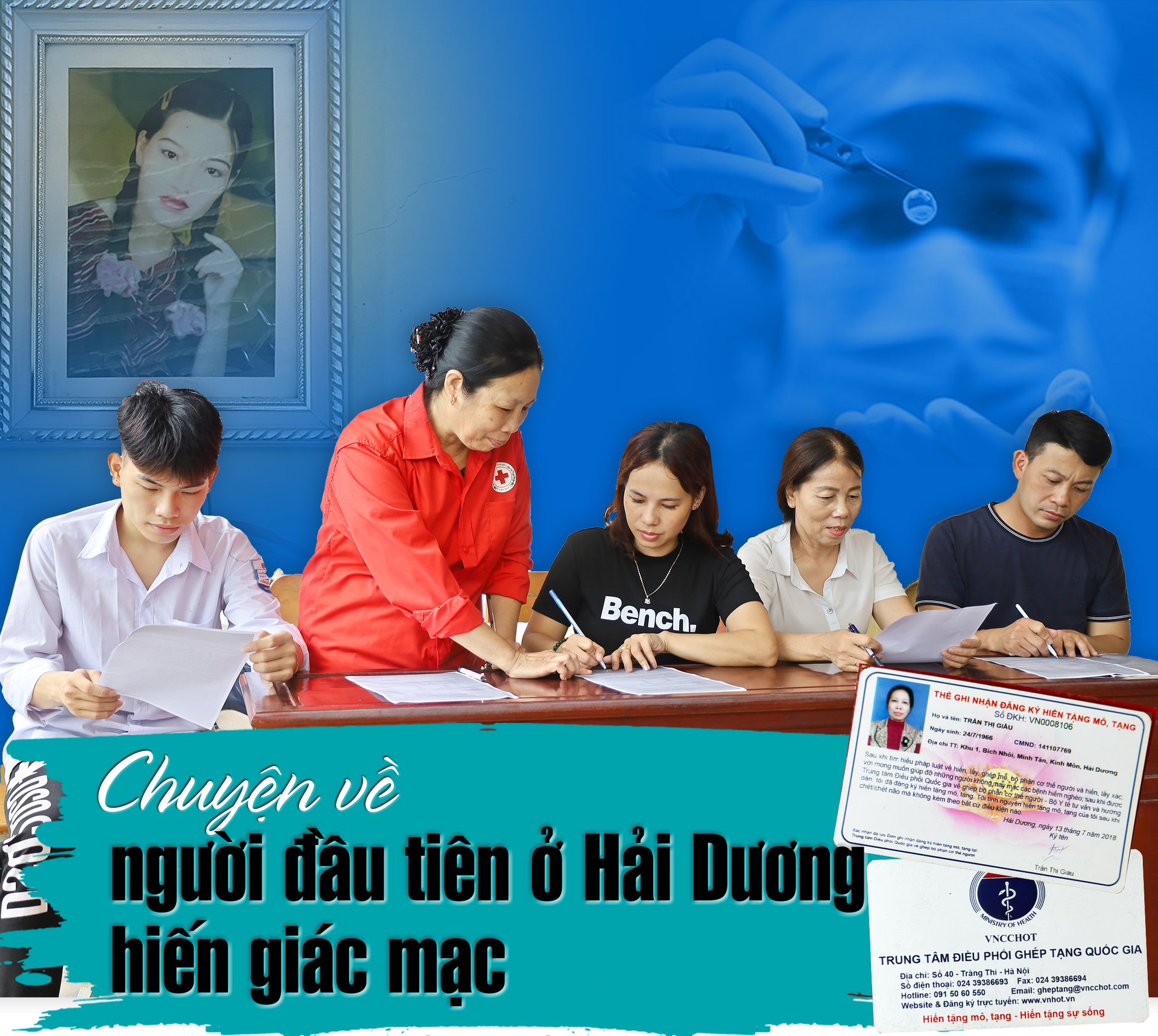
Ms. Nguyen Thi Nga (born in 1987) was the first person in Hai Duong province to donate corneas after her death. Exactly 10 years after her death, this noble act is still spreading in the community every day, contributing to building a humane, compassionate and loving society.

This season, the bougainvillea trellis in front of the house where Ms. Nga was born and raised in An Nhan Tay (Tu Ky town) is blooming a bright red. Looking up at the bougainvillea clusters playing with the sunlight, Ms. Vu Thi Du (Ms. Nga's mother) reminisced about her daughter with a choked voice: "That cluster of flowers is my daughter, and those rays of sunlight are the light she left for life. Nga has gone far away, but I always feel like she is by my side. My family is very proud of my daughter."
.jpg)
Showing me the carefully wrapped mementos related to her daughter, Mrs. Du said that when Nga was young, she was pretty, intelligent, and well-behaved. But when she was in 9th grade, disaster suddenly struck when she was diagnosed with a spinal cord tumor, paralyzed, and had to drop out of school. For the next 10 years, Nga was bedridden, unable to move, and relied on her parents for all her daily activities. The family was poor, and Mr. and Mrs. Du worked hard to earn enough money to feed several mouths and buy medicine to sustain their daughter's life. Mrs. Du had to ask for old blanket covers, bring them home, and sew them into small pieces of cloth to wrap and absorb the sores on Nga's body from lying down for a long time. Every few days, she went to the District General Hospital to ask for used urinary catheters from pregnant women, brought them home, boiled them, and gave them to her daughter to reuse.
In the last years of her life, Nga's illness deteriorated rapidly. The excruciating pain tormented her body and the heart of the hard-working mother day after day. Mrs. Du was desperate, crying her eyes out because of the many sleepless nights, missing her child. One day, her desperation reached its peak, she tied herself and her child together with a rope, intending to plug them into an electrical outlet to free herself. "Nga tried to dissuade me, saying that before she died, she asked her mother to let her do something meaningful. When I heard her talk about her wish to donate her corneas after she died, I was stunned, my mood was confused, I couldn't say anything but hug my child and cry. Nga was very optimistic, and encouraged me not to be sad," Mrs. Du recalled.
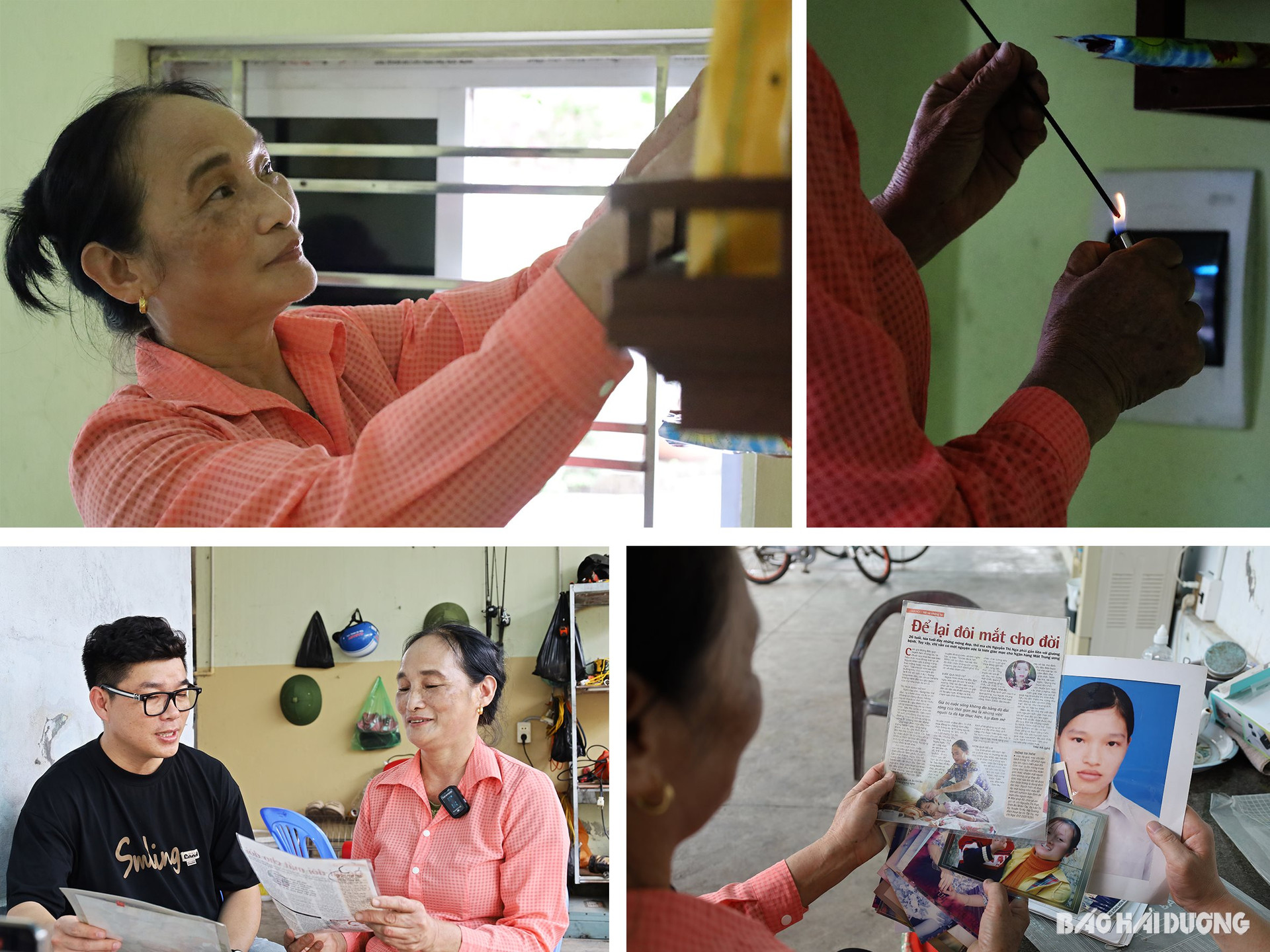
It turned out that a few years ago, while watching TV, Ms. Nga learned that donating corneas after death would help others who were blind due to injuries to have a chance to recover their sight. She had cherished this wish, waiting for the right time to say it because she was afraid that her parents would think too much and fall ill.
Faced with her daughter's wish, Mrs. Du's entire family was troubled, not knowing what to do because no one in the locality had ever done this. People in the neighborhood and outside the village whispered, saying that it was cruel for her and her husband to agree, and they advised that they should let their daughter "die in one piece". It took a long time, but Ms. Nga finally convinced her family to agree. Mrs. Du wrote a voluntary application on behalf of her daughter and sent it to the Central Eye Bank (Central Eye Hospital).
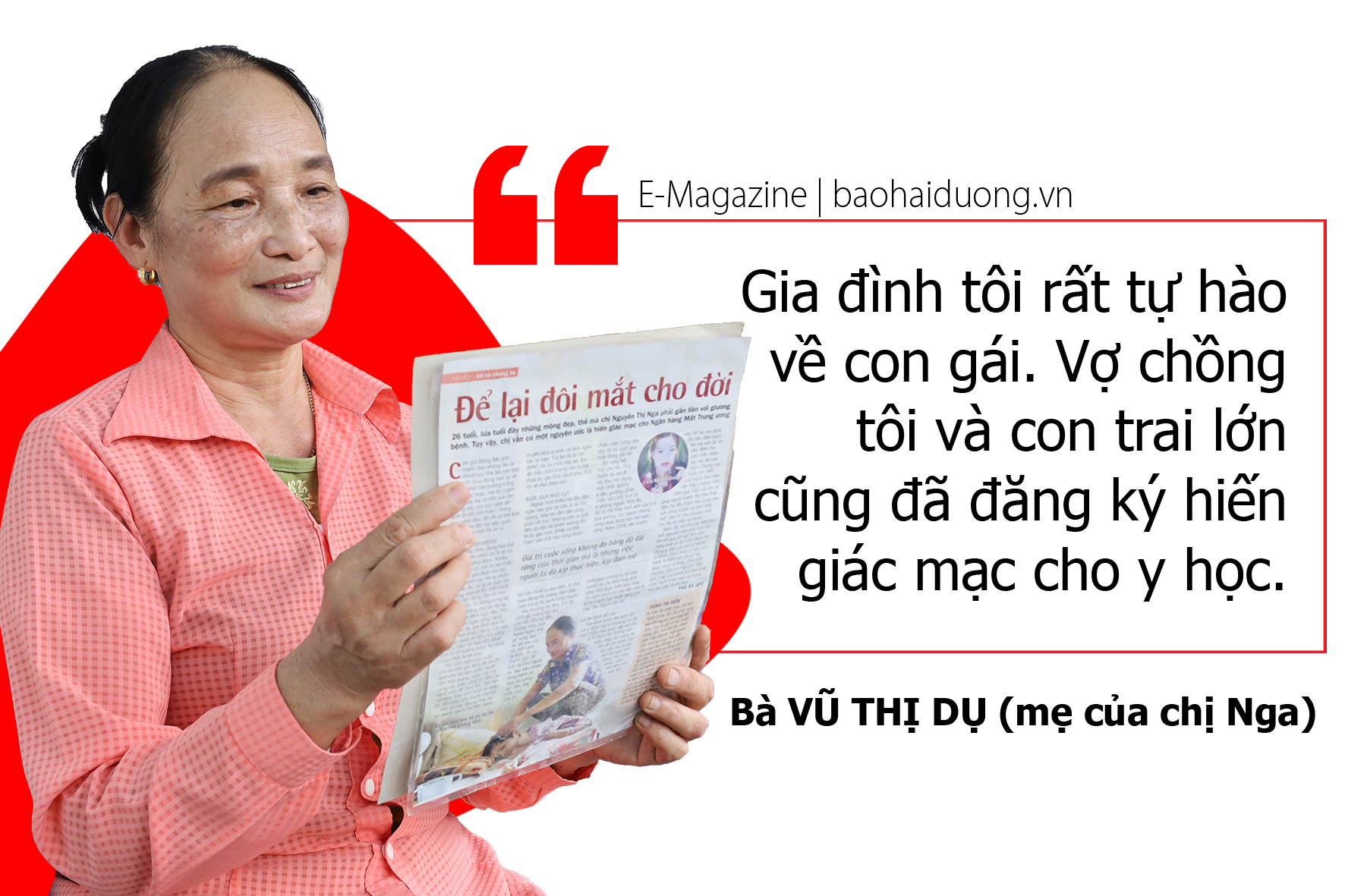
In the spring of 2014, Ms. Nga's heart stopped beating after 10 years of fighting the disease. That night, it was raining and freezing cold, but the doctors from the Central Eye Bank were still there on time to help her fulfill her wish. Ms. Nga became the first person in Hai Duong province to donate her cornea in particular, and human body parts in general, to medicine.
.png)
80 days later, a ceremony to "honor the noble gesture of the cornea donor" was solemnly organized by the Central Eye Hospital and the Tu Ky District Red Cross Society right in Ms. Nga's hometown.
.jpg)
That day, the delegates and people attending the ceremony were very moved when they heard the representative of the Central Eye Hospital announce: "The corneas that Ms. Nga left behind were successfully transplanted into two patients. Both of these people have recovered their vision and can see normally." Mrs. Du stood still, tears welling up in her eyes, but they were tears of happiness and pride.
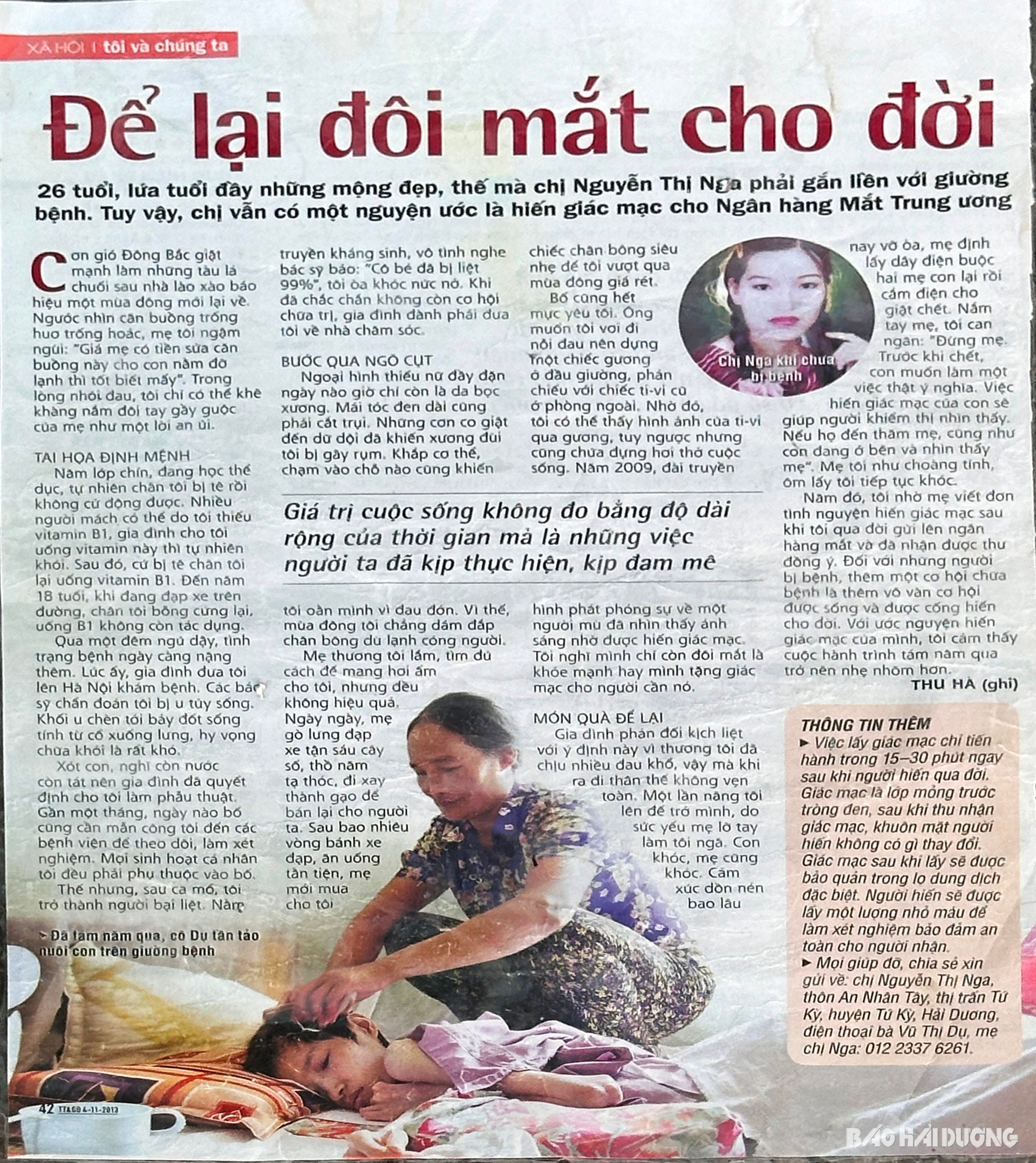
Information about the first person in Hai Duong province to donate corneas after death has been spread by many press and media agencies from the central to local levels. Ms. Nga's noble act quickly changed people's awareness and concepts, awakened thousands of kind hearts, and sparked a movement to register to donate corneas and human body parts, not only in Hai Duong province. "After the ceremony, I received many phone calls, including calls from other provinces asking about how to register to donate corneas and human body parts. In Tu Ky town, many people also registered, including my husband, my wife and my eldest son," Ms. Du informed.
After the ceremony to honor Ms. Nga's noble act, the Central Eye Hospital and the Hai Duong Red Cross Association coordinated to organize 12 training courses to disseminate related knowledge. The movement of donating tissues, organs and human body parts in the province continued to spread and received more and more support from the community.
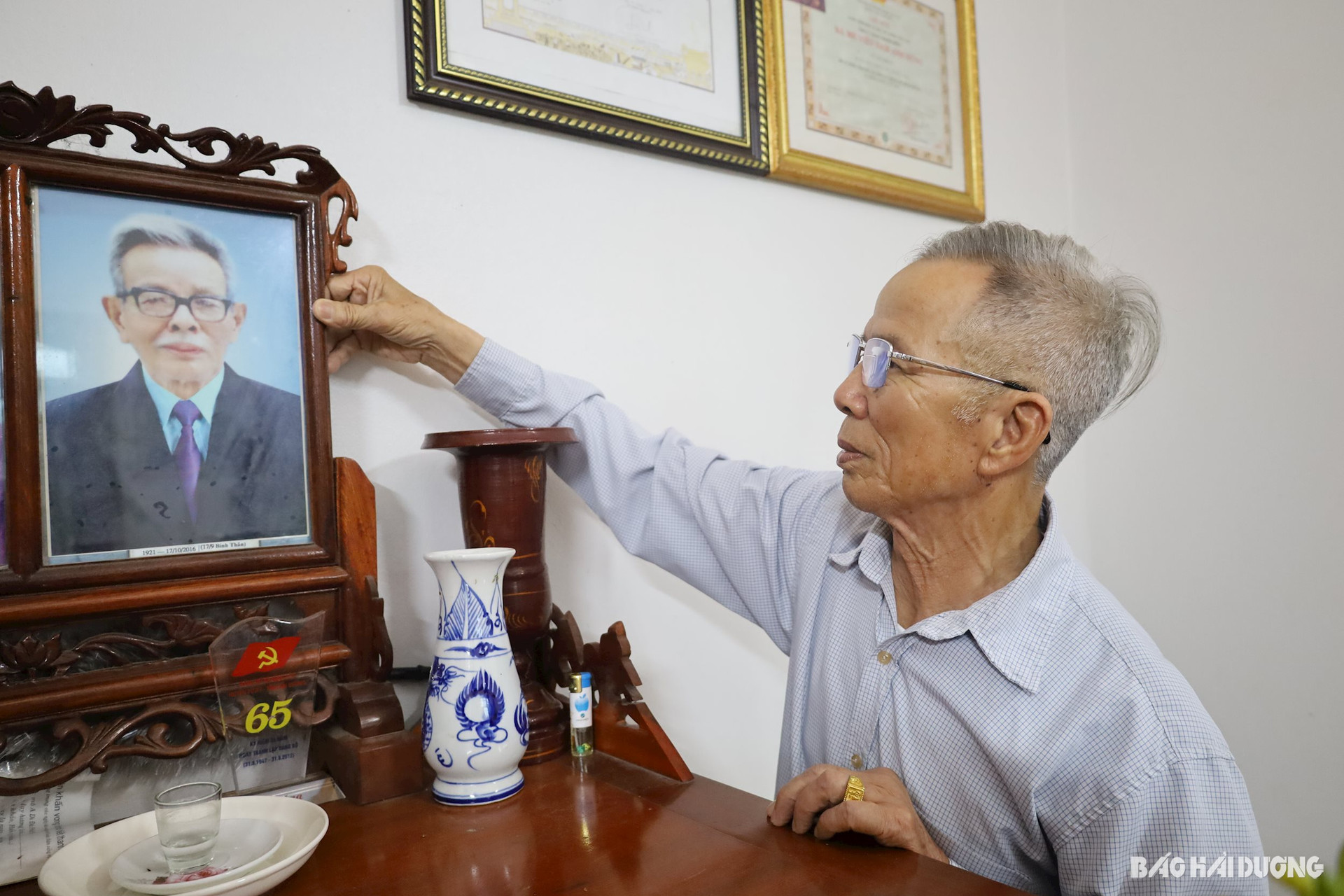
In 2016, Hai Duong recorded the second case of cornea donation after death. That was Mr. Vu Quang (born in 1921) - a party member living in Minh Duc commune (in the same Tu Ky district). Knowing about Ms. Nga's noble gesture through television, he wrote a voluntary application to donate his cornea. Mr. Vu Ban (Mr. Quang's son) said: "The children and grandchildren in the family have fulfilled my father's wish. After he passed away, the cornea is no longer useful but has great value to the living."
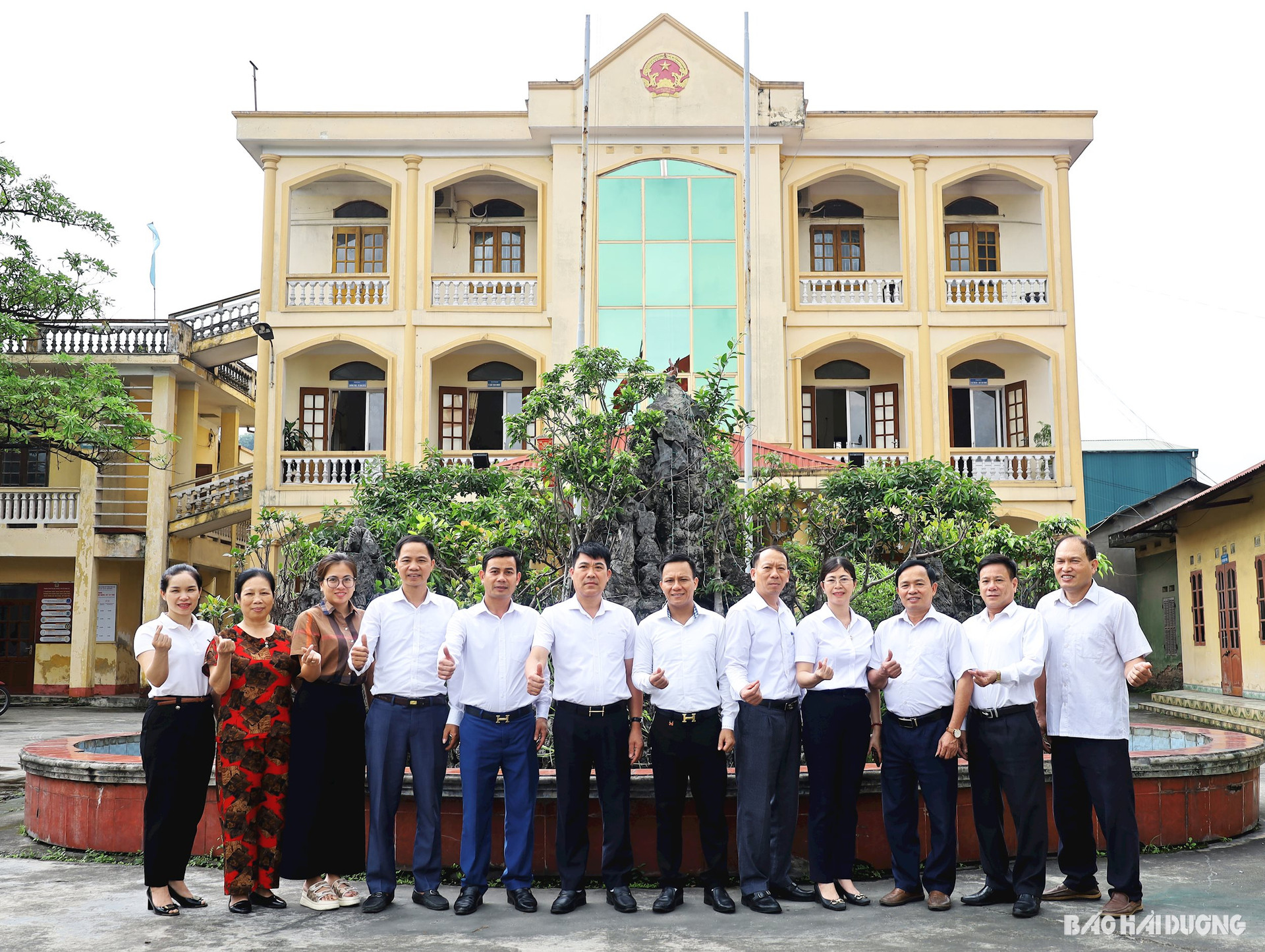
Coming to Minh Tan ward (Kinh Mon), I was surprised to see that over 200 people had written applications to register to donate human organs, 51 people had been issued cards by the National Organ Transplant Coordination Center. Out of 32 ward officials and civil servants, over 10 had registered to donate. Mr. Tran Khac Quyen, Party Secretary and Chairman of Minh Tan Ward People's Committee, also registered to donate human organs, sharing: "If I give away something after my death that can be useful to society, I don't have to hesitate. As a cadre and party member, I have to be an exemplary participant."

Ms. Tran Thi Giau, President of the Red Cross Society of Minh Tan Ward, and her husband, Mr. Nguyen Van Dien, both registered to donate their organs. One of their two children also followed their parents' example. Ms. Giau said that in the area where she lives, many couples have registered, and many young people are also enthusiastic about participating. "At first, when we first started the campaign, people were hesitant. But through the conference and the times when women went to the market and sat around talking to each other, I explained and promoted the noble humanitarian meaning of this, so they gradually understood and voluntarily participated in the spirit of giving is forever," Ms. Giau shared.
.jpg)
The movement of donating human organs has been developing in many places in the province. According to the provincial Red Cross, thousands of people in all 12 districts, towns and cities in the province have registered to participate, nearly 1,400 people have been issued cards. The provincial Red Cross is "reactivating" the movement of donating human organs in the community after a period of interruption due to the Covid-19 pandemic.
On April 25, the Chi Linh City Red Cross Society coordinated with the National Coordination Center for Human Organ Transplantation to disseminate knowledge about tissue, organ and human organ donation to more than 300 leaders of the People's Committee, the Vietnam Fatherland Front Committee, heads of departments, branches, and organizations of communes and wards in the city. Associate Professor, Dr. Dong Van He, Deputy Director of Viet Duc Hospital, Director of the National Coordination Center for Human Organ Transplantation, directly delivered knowledge at this conference.
.jpg)
Talking to us, Mr. He said that Hai Duong is one of 30 provinces and cities nationwide where the movement to register for organ donation is developing, spreading evenly and attracting more and more people. The province has a large population, people are compassionate, and the Red Cross at all levels in the province have creative ways of doing things, so this movement is still developing.
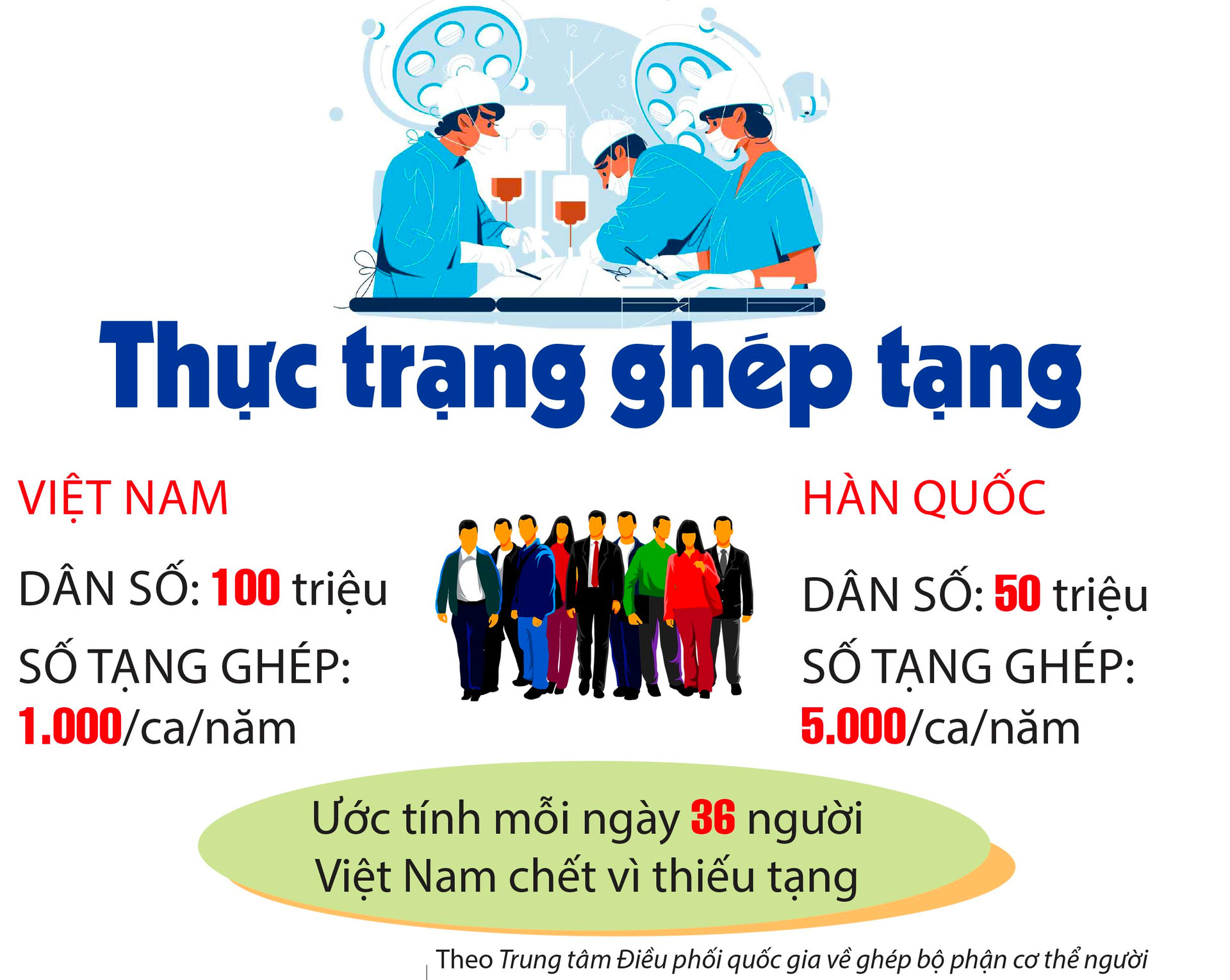
The need for human tissue, organ and body part transplantation in Vietnam is increasing. Our country's population is larger than some countries in the region, but the rate of people registering to donate human body parts is lower.
Mr. He said that we must innovate our approach to promote this movement like Hai Duong is doing. "In many other provinces and cities, training is mostly only for Red Cross officials, but recently in Chi Linh, it has been organized for leaders of the People's Committee, the Fatherland Front Committee and socio-political organizations at the commune level. This way of organizing is worth learning for other places," Mr. He said.
.png)
Associate Professor, Dr. Dong Van He expressed his emotion when we recalled the story of Ms. Nga. He said that in 2014, the number of Vietnamese people donating corneas was not much. In Hai Duong and neighboring provinces and cities, Ms. Nga was the first person. Therefore, Ms. Nga's noble act at that time became a "phenomenon". That phenomenon has been moving, liberating awareness, thinking, and motivating many people in Hai Duong province to boldly hold in their hands the application form to register to donate human body parts.
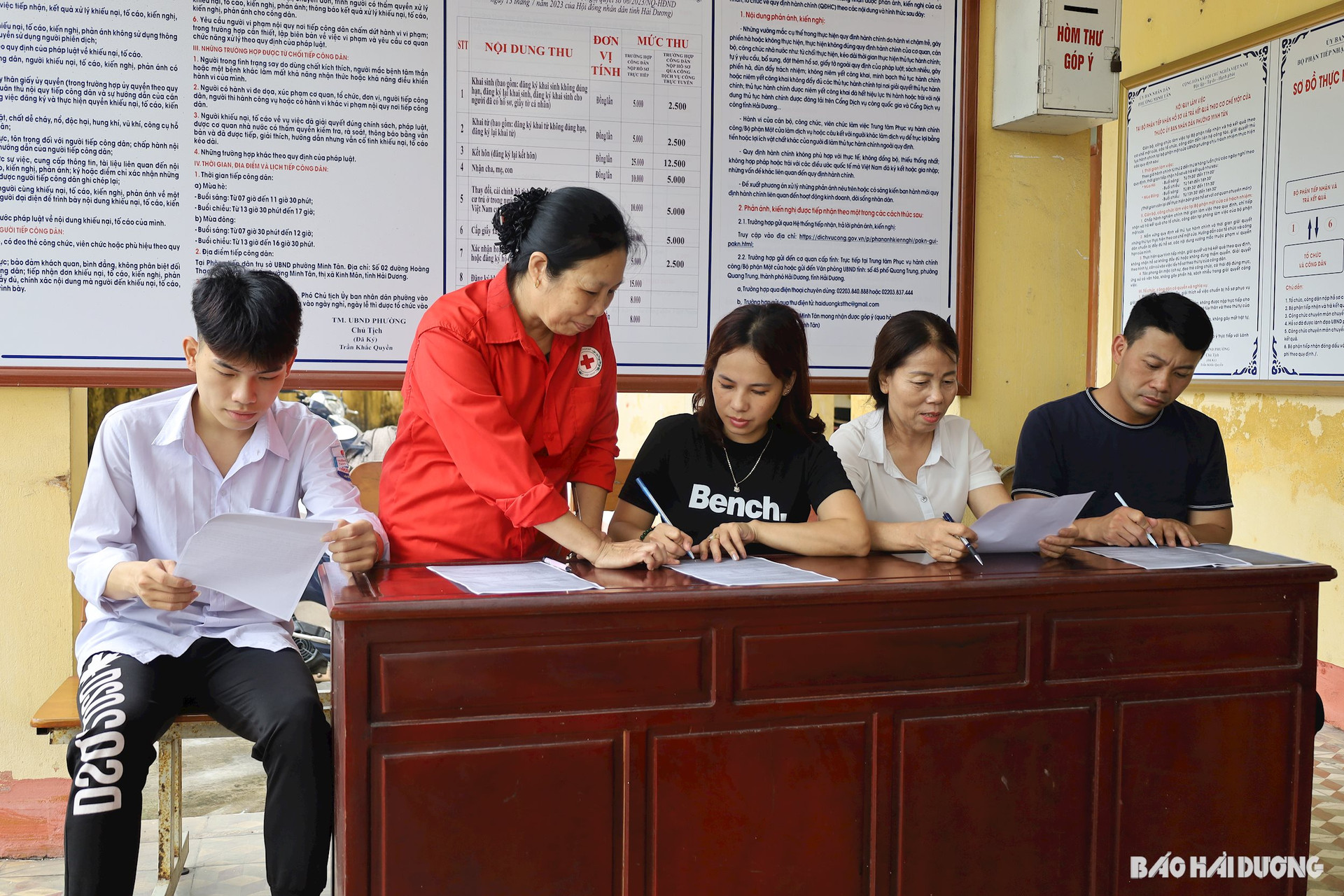
The noble act of Ms. Nga in Hai Duong in particular, and other examples in many provinces and cities across the country in general, have touched tens of thousands of kind hearts. As of May 2024, the whole country had over 86,000 people registered to donate tissues, organs, and body parts, an increase of about 24,000 people compared to 2022.
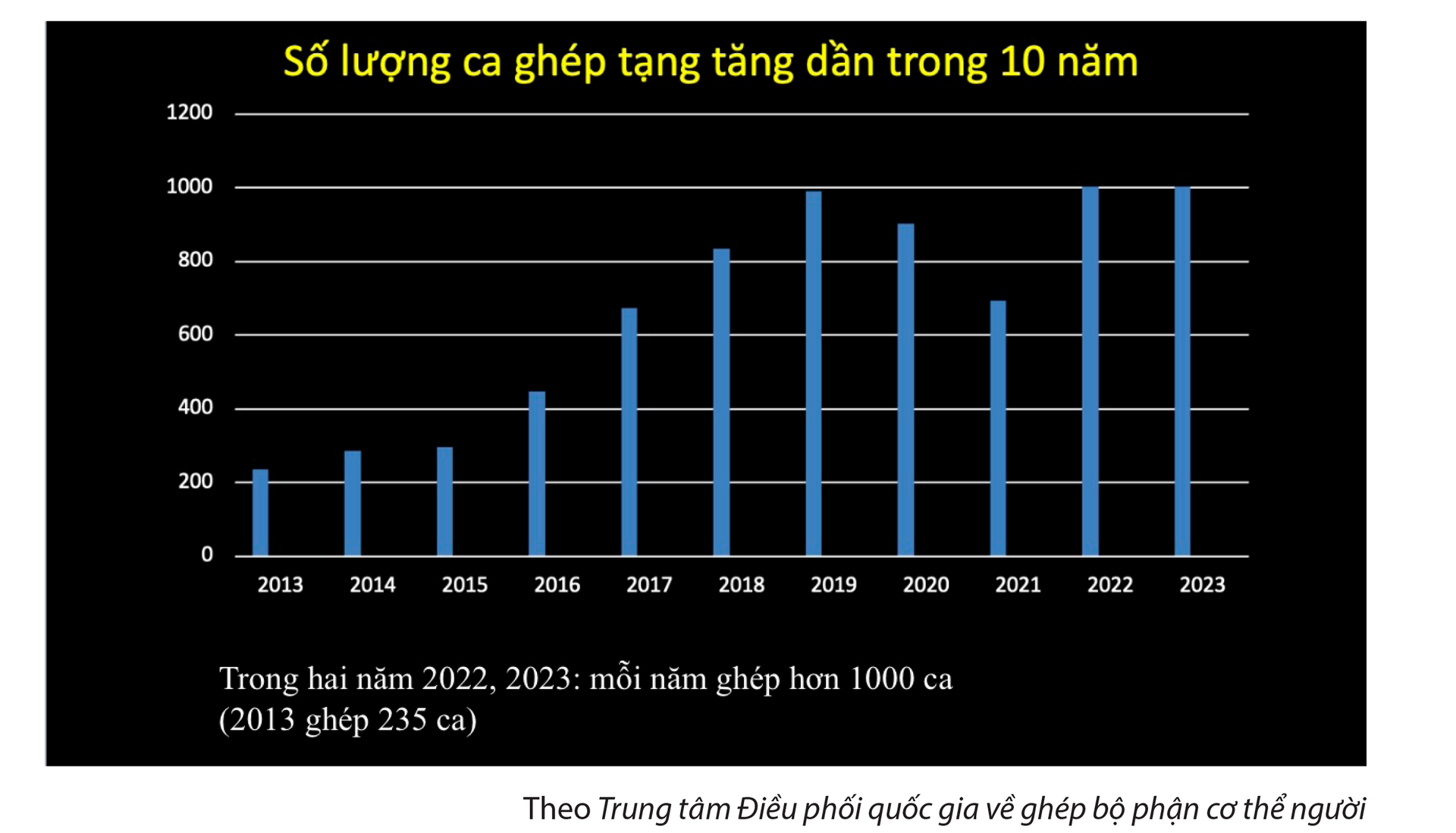
"This growing movement not only contributes to continuing the nation's fine humanistic traditions but also writes a new cultural flow of the Vietnamese people - a culture of dedication," Mr. He emphasized.

The Hai Duong Red Cross Society currently has about 70,000 members and 15,000 collaborators. Chairman of the provincial Red Cross Society Nguyen Van The said that this will be the core force to continue promoting the movement of human organ donation. This year, the society organized 20 first aid training courses combined with propaganda and mobilization for human organ donation. "We will promote this movement to contribute to creating a united, humane, compassionate society, full of love, creating a foundation for building and developing the homeland and the country," Mr. The emphasized.
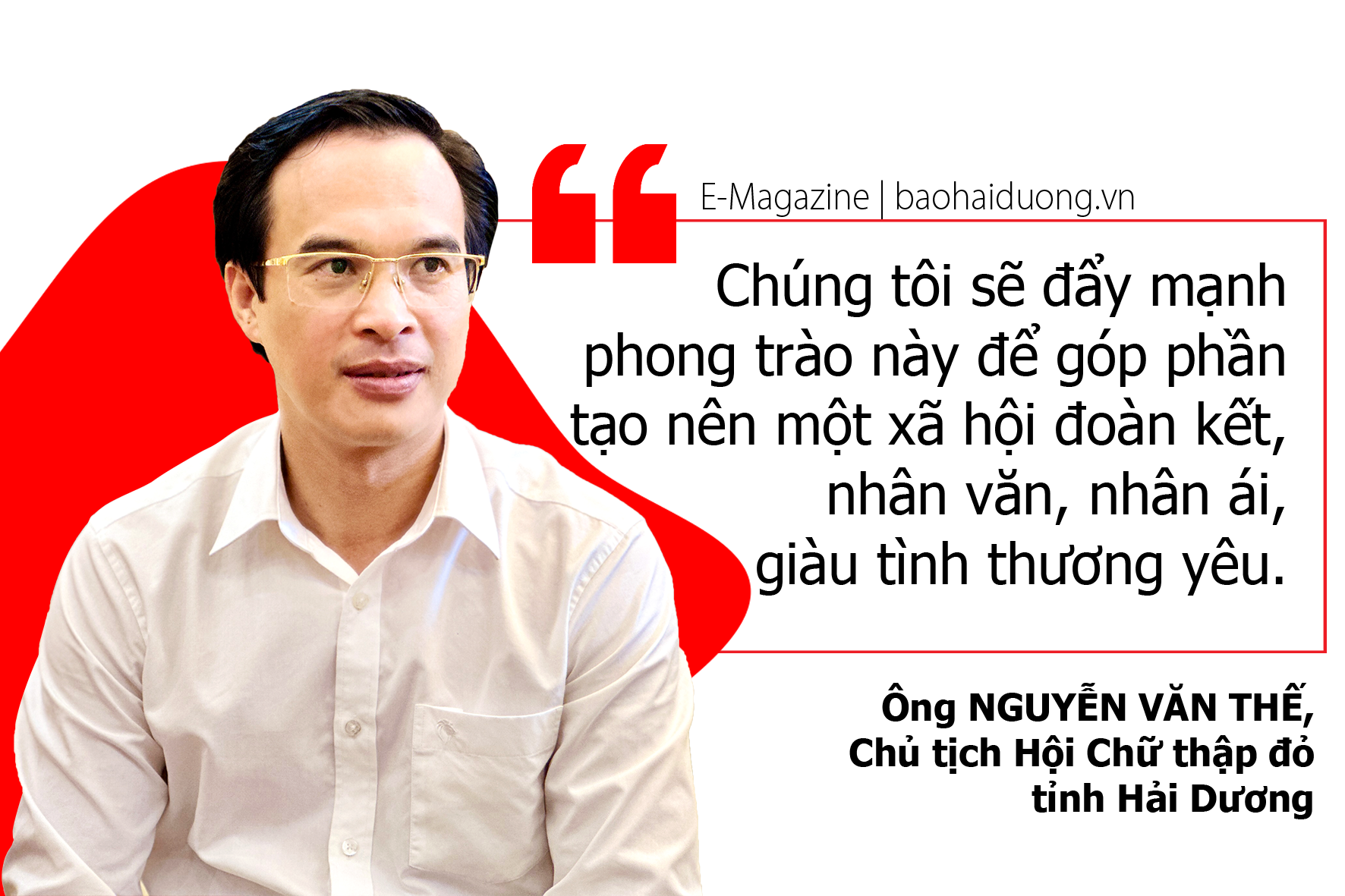
Writing about Ms. Nga and the above movement, I suddenly remembered the lines of poetry that poet To Huu wrote before he passed away: “Goodbye to my most beloved life/A few lines of poetry, a handful of ashes/Poems sent to my companions, ashes to fertilize the soil/To live is to give, to die is also to give”.
Content:GOING STRONG
Presentation, photos:TUAN ANH